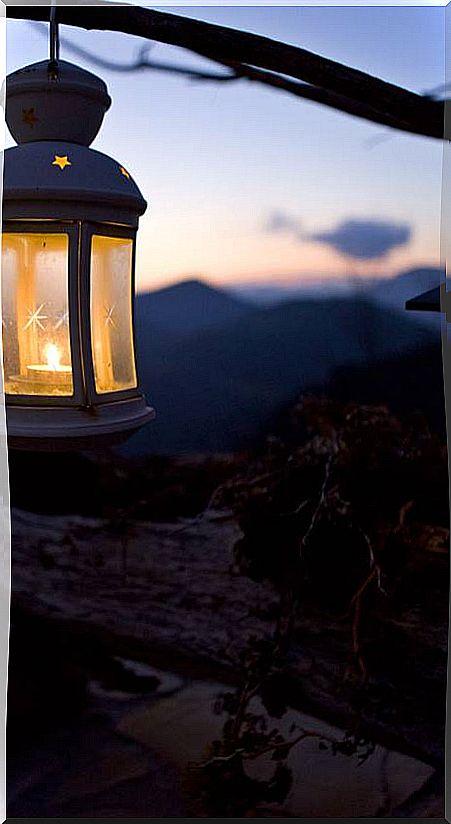Magic Exists On A Daily Basis, Do We Celebrate It?
Living everyday life with joy depends more on our way of seeing things than on what happens around us. Every moment contains a treasure.

Sometimes we have the feeling that few extraordinary things happen in life. We look at the big events – a wedding, a long trip, the birth of a child – and we do not appreciate the gifts that, moment by moment, each day offers us.
In one of the most memorable scenes in the film adaptation of Alice in Wonderland , the Mad Hatter celebrates “nobirthday day.” That is to say: each date on the calendar deserves a party, since existence is lived day by day and we never know when it will end.
If we become aware of it, we will be in a position to celebrate the everyday. Riding on the back of the urgent, we often miss the little wonders that give meaning to our days. The magic of life is often shown in the humble and subtle.
As an old oriental proverb says: “You are here just passing through, stop to look at the flowers.”
10 ways to celebrate every day
Lola Mayenco, in her excellent book Something to celebrate , reflects on this lack of attention of the current human being, always busy, towards those moments of profound beauty and meaning: “The sunrises in the sea, the walks in the mountains with the children , breakfasts on Saturdays (…), parties with friends, stormy afternoons, sunsets or nights with a rain of stars “.
This list of everyday miracles could be completed with other little treats for the senses – and for the soul – that take place indoors. The smell of fresh bread or tea, the cat purring in our lap, a conversation by candlelight.
This Barcelona journalist divides the daily reasons for celebration into ten areas :
- Moments : Since each moment is unique, the best way to honor it is to give it the value of unrepeatable and savor it accordingly.
- Places : Appreciate the space where we are, admiring its details and nuances with ever new eyes. As Henry David Thoreau said: “Paradise is above our head and under our feet . “
- Elements : We assume essential goods for our survival, such as water or the sun, which are scarce in many parts of the planet. By receiving them we can experience gratitude.
- Plants : The foods that nourish us on a daily basis, as well as the plants that help us heal or the flowers that feed our spirit, are also cause for celebration.
- Animals : Whether we live with pets or enjoy watching the flight of birds, our planetmates are masters in the art of simplicity and spontaneity.
- Possessions : Valuing what we have instead of yearning for what we wish we had is the key to present satisfaction.
- Body : We perceive the world and enjoy it through the senses. Therefore, taking care of our only vehicle for life is preparing it for a daily feast.
- Mind : It is impossible to appreciate the wonders around us if we place the veils of negativity and preconceptions between ourselves and the world. In part we are what we think.
- Heart : Investigating our feelings and motivations allows us to delve into our own essence, which will benefit our relationships with others.
- Soul : Cultivating spiritual life on a day-to-day basis (it is not necessary to follow a religion for this) expands the bandwidth of our consciousness for a fuller celebration of life.
Rituals for every moment
A series of stretches or trying the “sun salutation” (yoga) to loosen up the body is a good start for what awaits us today.
Instead of eating just about anything, 20 minutes for a peaceful and nutritious breakfast will provide energy until the middle of the day.
Walk after lunch. Especially if you are working close to a table, a short turn to breathe out will revitalize your body and mind.
The daily contact with any form of creation – literature, music, art …- or the natural world is a balm for the soul.
A relaxed conversation, meditation or other initiative that instills calm in us will bring a good end to the day.
Celebrate the mundane of work
When we stop of our own free will or life slows our course – for example, through illness – we are all capable of appreciating the beauty of roses, an elaborate dish, or cheerful company.
However, life is not just about leisure. How can we celebrate the everyday at work or in repetitive tasks at home?
The monk and philosophy graduate Keisuke Matsumoto sees in these tasks an opportunity for growth and spiritual purification. In his curious Cleaning Manual of a Buddhist monk he explains: ” Our journey begins with cleaning. The interior of the temple, the garden, is swept, and the floor of the main hall is scrubbed.”
“But we do not clean because it is dirty or messy, but to rid the spirit of any shadow that clouds it.”
In the same way that every external journey ends up being internal as well, when we give a deep meaning to what we do, however humble the work, with this we manage to relax the body and calm the mind, freeing up space for creativity.
For this reason classical Zen, as well as the new mindfulness technique , insists on putting the five senses in what is being done, as if it were the most important thing in the world. Instead of torturing the mind and wearying the body with scattering, focusing on just one thing leads to a state akin to meditation.
Matsumoto sees the celebration of daily tasks as an antidote to dissatisfaction: “Many people believe that freedom is making what you want a reality. But that is not freedom. From the moment you want to do something, your heart is a prisoner of desire. Freedom is living in peace day by day (…) “
“And that is achieved by adding our actions one by one. For example, the time we dedicate to cleaning with care.”
This same care and appreciation for cleanliness that Matsumoto talks about can be applied to everything around us, turning the gray routine – color is the mind – into a space for serenity and wholeness.
It all depends on our perception
Given that the radiance of everyday life depends on our perception of things, people and moments, let’s see what are the attitudes that fill our gaze with dust and clouds.
The false belief that there is no time to enjoy this moment. If we analyze the day a posteriori, we will discover that we have lost part of the day on secondary matters.
Anchoring to the past or recreating with the future are two ways to escape from a now that is our only good.
Wish things were otherwise. This is another mental trap to not face the day we have in hand and take responsibility for our real life.
An anonymous American account eloquently illustrates both attitudes towards the present: that of the monk who settles in the now and that of the restless being who avoids it. Its protagonist is the walker who arrives in a town and addresses an old man who is sitting under a porch doing nothing.
“Listen, good man,” asks the stranger. Do you know where this road goes?
“I’ve never seen him go anywhere,” says the old man. Every morning when I wake up, I look out the window and it’s still there.
“What I want to know is if I have to take it to go to Fortsmith.”
–It doesn’t make any sense to do it: they already have a road there.
“I suppose you’ve lived here all your life,” says the perplexed stranger, to which the old man replies:
-Not yet.
Like the old man in this story, in the celebration of the everyday, the gaze on the journey prevails. It will be enough to open your eyes and the rest of the senses to understand that everything that happens around us is an unrepeatable gift.









